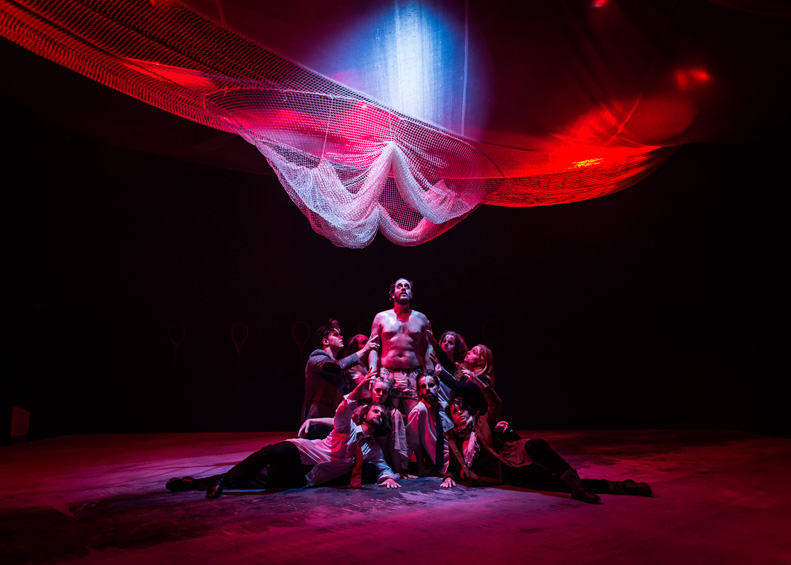Le tigre bleu de l’Euphrate : a beautiful depiction of a conflicted Alexander the Great taking stock of his life at the height of a feverish delirium

Le tigre bleu de l’Euphrate is a solo show capturing the emotional, agonizing final night of Alexander the Great, as he lays dying of a fever.Written by Laurent Gaudé and brought to life in a beautiful performance by Emmanuel Schwartz, the performance is a monologue and meditation as the first man to make a serious effort at conquering the known world faces his own demise. Over the course of the hour and a half–long show, Alexander reflects upon both his mortality and immortality, slipping into despair as disease claims him, but finding solace in his military exploits that will make him as immortal as the soil beneath his feet.
Le tigre bleu isn’t simply a history lesson though. While it does spend some time recounting his campaigns in Persia, his founding of Alexandria, his battles in the Indus River Valley, and his life in Babylon, it is a much more introspective look at Alexander than offered in history books. We can’t know what Alexander was thinking in his final hours, so playwright Gaudé creates an Alexander grappling with guilt over the countless lives lost on his grand campaigns, but also one assured of his everlasting fame from those same battles that haunt him at the end of his life.
Le tigre bleu traffics almost exclusively in inner turmoil. A good example of this is Alexander’s views on Alexandria, Egypt. He seems to be able to predict that Alexandria will become a great city—it was the leading city of the greatly expanded Greek world during the Hellenistic period—and feels proud and boastful of his landmark achievement. But in a more delirious moment, he envisions Alexandria as a city populated by everyone who died on his campaigns. One of his greatest achievements is marred by the slaughter on his hands.
In any solo show, most of the weight falls on the actor, and Schwartz doesn’t disappoint. He steps compellingly and convincingly into the role of a feverish Alexander, at turns delirious, ranting, stumbling, wrapping himself in blankets and muttering, as he reminisces upon his past military glories and descends into the depths of guilt and illness-induced depravity. It seems a dream role for an actor, an opportunity to explore psychological depths denied to a sane character, and Schwartz never misses a beat nor for a moment fails to convince the audience of his madness and delirium.
The set and sound design was also impressive and added greatly to the overall feeling of the play. Projected on the wall were images that changed to match Alexander’s reminisces—a desert when he talks of Alexandria, shadows of elephants when he describes his fighting in the Indus River Valley. The sound design was a forlorn, sparse, martial soundtrack that fleshed out Alexander’s military memories and heightened the emotional moments when he grapples with his impending death.
All in all, the NAC’s Le tigre de l’Euphrate is a hauntingly beautiful depiction of the world’s first great conqueror facing the one thing that can never be vanquished—his own mortality—with the immortality of his name and deeds a hollow victory.
Playwright Laurent Gaudé
Director Denis Marleau
Scenography Denis Marleau and Stéphanie Jasmin
Lighting Marc Parent
Music Phillipe Brault
Alexander interpreted by Emmanuel Schwartz